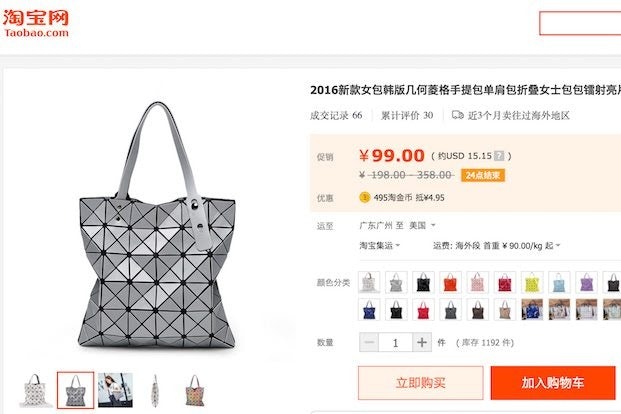
This article was published earlier in our weekly newsletter. Sign up through our “Newsletter Sign Up” box on the right.
After the recent major drama over Alibaba joining the International AntiCounterfeiting Coalition, brands that revolted against the decision have won now that the Chinese e-commerce giant has been suspended from the organization.
The group made the announcement last Friday that it had suspended the membership after brands were up in arms against the decision to allow Alibaba to join. As a result, Jack Ma canceled his keynote speech scheduled for the organization’s annual convention only days before it was set to take place. Alibaba’s suspension was announced after an anonymous letter threatened mass resignations, while Gucci, Michael Kors, and Tiffany & Co. dropped out of the group altogether. Michael Kors didn’t mince words when it called Alibaba its “most dangerous and damaging adversary.”
The Alibaba membership had been quite an unconventional one for the group, which typically only allowed in brands directly affected by counterfeiting. In an announcement on April 13, 2016, the IACC revealed that it had created a new “general” membership category and that Alibaba was the first member to join under this designation, also becoming the first e-commerce company to join the IACC. According to Alibaba's blog Alizila, "IACC President Bob Barchiesi noted that room was made for Alibaba in the coalition through the creation of a new general membership category." Even this separation from regular members wasn’t enough to placate brands, as this category was suspended a month after the April 13 announcement on May 13.
The IACC stated on May 6 that the creation of the category was due to "eBay's and others' interest in joining," although eBay did not become a general member during this month. The company announced that the category suspension also effectively suspended the general membership of e-commerce sites TheRealReal and Wish.com, but the statement did not include dates they had become members after Alibaba.
For those who were wondering why the group would go out of the way for a decision that would cause such an uproar in the first place, an idea of what the answer could be came when the Associated Press reported that the group’s president Robert Barchiesi owned stock in Alibaba since its 2014 listing. In addition, his family has close ties to Alibaba’s new VP of intellectual property enforcement, Matthew Bassiur. One of Barchiesi’s sons worked for Basseur at Apple in 2011, while another son runs a foundation where Bassiur sits as a founding board member.
That foundation, the ICE Foundation, is focused on supporting U.S. Immigration and Customs Enforcement employees. It has received a grant of $10,000 from the AntiCounterfeiting Coalition annually since 2012, and awarded a contract for “fiscal and operational management” to a private company owned by Barchiesi’s son.
This news has caused a mess for the IACC, as former board members are speaking out to complain that this represents a huge conflict of interest given the fact that IACC membership could have caused Alibaba’s stock to rise and lead to profits for Barchiesi.
But it’s likely caused even bigger trouble for Alibaba, which has come out looking decidedly sketchy in the whole deal at a time when it’s trying to convince luxury brands that it is earnestly doing everything it can to fight fakes. The hiring of Bassiur, who previously handled intellectual property at Apple, should have been a major step forward for the brand in showing that it was dead serious about its stated efforts to eradicate counterfeits. Instead, the narrative now comes off looking like the company just wanted his ties to an organization that could help boost an image of legitimacy rather than his expertise in fighting fakes.
As it works to get more luxury brands such as Burberry and Calvin Klein to sign up for its Tmall platform, Alibaba has likely learned the hard way that there won’t be any shortcuts when it comes to convincing the industry that its efforts are genuine. Questionable deals like this one only help to make it come across as disingenuous, and brands that have been burned by rampant fakes in China are not quick to trust an organization that has profited off them.
For an in-depth look at the market for online counterfeits in China, download Jing Daily's recent report.